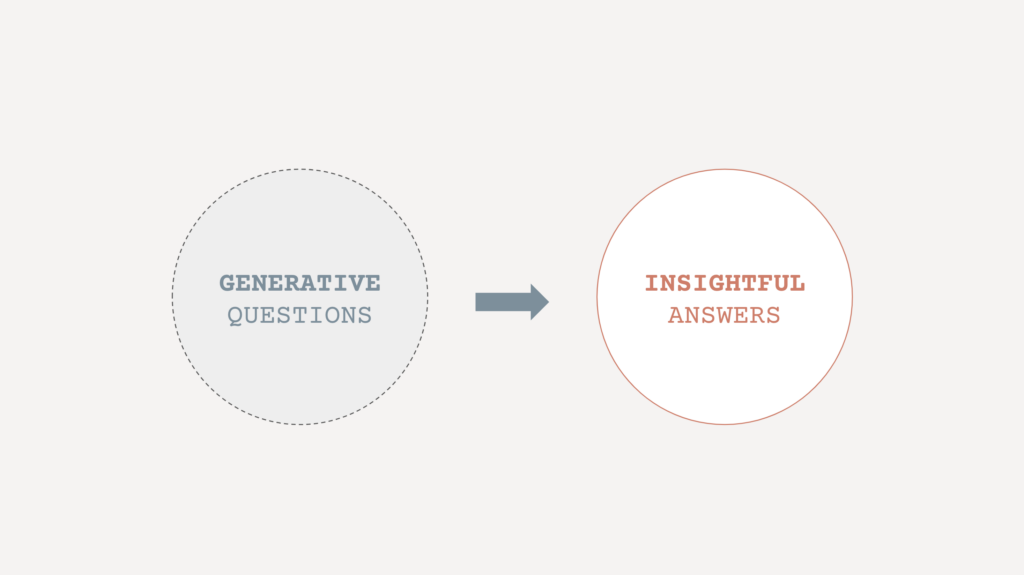We all know that children are curious. Very curious. In fact, children ask more than a hundred questions an hour. This is how they explore, learn, and make sense of the world.
However, researchers lament that “over the course of their education, students and adults ask fewer questions and more passively accept facts as the way things are.” This is a shame, because asking questions is a crucial skill that fuels lifelong learning and critical thinking.
In your personal life, asking questions fosters deeper understanding and empathy which can support healthy relationships. Professionally, it drives innovation, encourages collaborative problem-solving, and leads to more informed decision-making. By not asking enough questions, we limit our potential for growth, understanding, and connection in an ever-evolving world.
There is a type of question that yield powerful insights and allows curious minds to better connect with others and explore the world. Those are called generative questions, a kind of questions that bring together various ideas or skills from different areas of knowledge and experience.
Generative questions do not only ask about facts, but also about feelings, underlying motivations, and cultural context. They are open-ended, multidimensional, and empathetic. They aim to truly understand the world.
While asking generative questions comes more naturally to some people, it can be learned by anyone. And when you ask generative questions, you get insightful answers. That’s a skill worth investing in.

The transformative power of generative questions
Without realizing it, lots of your work relies on thoughtfully crafting good questions: getting a helpful piece of information from a colleague, looking up the right thing, or probing a potential customer during a negotiation.
Ancient philosophical traditions also teach us to ask questions with intention. Socrates is famous for his use of questioning to investigate many topics, including the validity of an assumption, the logic behind an argument, and even the nature of the unknown.
The Buddha emphasized the importance of questioning to his disciples, and contemporary Buddhist practices continue to uphold this value.
Beyond satisfying your curiosity, crafting better questions allows you to do your best work. Pr. Jim Euchner explains that it allows your to discover:
- Things that you believe that you know and which in fact you do know.
- Things you believe that you don’t know but which, in fact, you do know (if you consider them properly).
- Things that you believe that you know but in fact you do not know.
- Things that you believe that you don’t know and which you, in fact, do not know.
In short, asking generative questions is a bit like being an alchemist. They have a transformative power that allows you to turn any conversation into a source of actionable information and creative insights.
How to ask generative questions
There is obviously no perfect recipe and a lot of your approach should depend on the complex dynamic interaction you have with the person sitting — physically or virtually — in front of you. That’s part of the “generative” aspect: thoughtfully crafting your questions based on the context and interaction.
However, there are a few general tips that can be applied to most conversations. Here are five guidelines to keep or to start asking generative questions.
- Know your purpose. It’s easy to get distracted during a conversation. Try to make sure that every question you ask helps you gather either facts or your interlocutor’s opinion. Avoid empty questions to fill the time. Genuinely try to know more about them, and frame your questions accordingly.
- Start by listening. In the classic How to Win Friends and Influence People, Dale Carnegie advised to “be a good listener” and to “ask questions the other person will enjoy answering.” More than eighty years later, his advice still holds true. You can’t ask generative questions if you don’t listen to what the person has to say.
- Interrupt wisely. It’s not about never interrupting the person you’re chatting with. It’s about ending fewer sentences with a period, and more with a question mark. Don’t worry about asking the wrong question. Not asking enough is more detrimental to building a relationship than asking one poorly phrased question. That being said…
- Use the right wording. Avoid leading questions and use a neutral tone instead. Refrain hinting at your opinion or the answer you’d like to get. If you want honest opinions or accurate information, don’t prime your interlocutor with loaded questions. Keep them open ended so they have the option of giving you an answer you didn’t expect. (closed questions are often used in manipulative surveys to get the results needed to support a specific agenda)
- Build a hierarchy. Follow general questions with specific ones, focus your questions so they ask one thing at a time, and use something in the answer you got to frame your next question. This will help the conversation flow more naturally.
The most important guideline to remember is simply to ask more questions. Of course, the tone, the framing, and the sequence of your questions will have a huge impact on the value you and your interlocutor will get from the conversation, but asking more questions is the best way to practice and ultimately get these right.
By asking generative questions, your conversations will be more productive, but also more enjoyable. You will be able to generate better ideas and, ultimately, to cultivate your curiosity.
